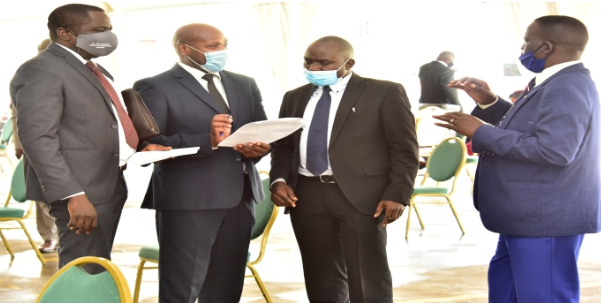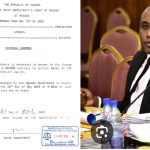Members of parliament have tasked the Attorney General and the Electoral Commission (EC) to appear before the Committee on Legal and Parliamentary Affairs, to clarify on the alleged consideration by the EC not to nominate persons whose names on the national identity cards differ from those on their academic transcripts.
The Speaker of Parliament, Rebecca Kadaga, has given the team up to the afternoon of Thursday, 24 September 2020, to present a report on the matter.
MPs say that the alleged consideration will affect many individuals especially women, who are vying for different positions of leadership, in the forthcoming elections.
While speaking to the concern raised by Hon. Angelline Osegge (FDC, Soroti), the Deputy Attorney General, Hon. Jackson Kafuuzi said that the implementation of the Registration of Persons Act legally demanded that every adult person who wishes to change his or her name must comply with the provision of Section 36 of the Act.
The clauses in section 36 of the Act provide for procedures under which any individual who is 18 years, or a widower, widow, divorced or married person; can have his or her name changed.
In the statement presented by the Deputy Attorney General to Parliament on Wednesday, 23 September 2020, aspirants for elective political positions who had changed names by reason of marriage would only require to present a sworn statutory declaration or an affidavit and a marriage certificate to the Electoral Commission.
This was if their names on the National Voters’ Register were different from the names on the academic papers.
However, after the commencement of the Registration of Persons Act, 2015 on 26 March 2015, adult persons who changed their names completely were required to go through the deed poll, which is a legal process of changing a person’s name provided for in Section 36 in the Act.
“What the Electoral Commission is saying is that they want to follow the law to avoid any legal challenges that may come both to the candidate or elected leader… and the Electoral Commission after nominations or General Elections,” said Kafuuzi.
He added that the deed poll provided for under Section 36 of the Registration of Persons Act, 2015 applied from 26 March 2015 when the Act came into force, thus aspiring candidates who changed names before the date, through a statutory declaration or affidavit would not be affected during the nominations.
Hon. Asuman Basalirwa (Jeema, Bugiri Municipality) said the coming into force of the Registration of Persons Act, 2015 did not provide a new method of changing names, but maintained the provisions word by word.
“The Electoral Commission should clarify the official position in regards to change of names. The clarification needed is that if somebody is adopting the name of a husband, is that a change of name?” Basalirwa noted.
Ndorwa County East MP Hon. Wilfred Niwagaba explained that the change of name provided for in the Act was that which was registered in accordance with the Act and subsequently changed, that required a deed poll.
“But adopting a name after marriage and then registering under the Act with names that do not tally with academic documents, only needs a statutory declaration to clarify that the names refer to one and the same person,” said Niwagaba.
The Deputy Attorney General responded saying that the Electoral Commission needed evidence, in this case a marriage certificate, to show proof that the documents presented belong to the individual presenting them.
The Leader of the Opposition in Parliament Hon. Betty Aol Ocan expressed concern regarding persons who have had traditional marriages that do provide marriage certificates, but are recognised marriages in Uganda.
The Deputy Attorney General responded: “Customary marriages ought to have been registered as per the law.”
Hon. Cecilia Ogwal (FDC, Dokolo) tasked the Electoral Commission to provide more mass sensitisation on all requirements and procedures concerning the ongoing electoral process.
![]()
























